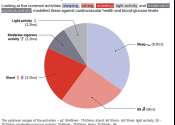Study finds preventable premature death rates to be higher in nonmetropolitan counties
Nonmetropolitan counties had higher percentages of preventable premature deaths from the five leading causes of death during 2010 to 2022, according to research published in the May 2 issue of the U.S. Centers for Disease ...
2 hours ago
0
0









